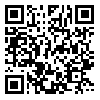Volume 10, Issue 3 (Autumn 2024)
J Health Res Commun 2024, 10(3): 73-83 |
Back to browse issues page
Download citation:
BibTeX | RIS | EndNote | Medlars | ProCite | Reference Manager | RefWorks
Send citation to:



BibTeX | RIS | EndNote | Medlars | ProCite | Reference Manager | RefWorks
Send citation to:
Boragh N, Arefi M, Hosseini S, Afsharinia K. Structural Equation Modeling of Corona Anxiety Based on Corona Knowledge and Social Support Mediated by Quality of Life. J Health Res Commun 2024; 10 (3) :73-83
URL: http://jhc.mazums.ac.ir/article-1-1019-en.html
URL: http://jhc.mazums.ac.ir/article-1-1019-en.html
Associate Professor, Department of Psychology and Counseling, Kermanshah Branch, Islamic Azad University, Kermanshah, Iran
Abstract: (2661 Views)
Introduction and purpose: The effects of corona anxiety have become one of the main health challenges that endanger people's quality of life. Therefore, this research investigated the relationship between Corona anxiety, Corona knowledge, and social support with the mediating role of quality of life in this field.
Methods: The present work follows a descriptive approach and the correlational design of the structural equation model type. The statistical population included all women working at the health centers of Kermanshah in the second half of 2022; among them, 364 were selected through cluster random sampling. Data were collected using the Corona Disease Anxiety Scale (CDAS) of Alipour et al. (2020), the World Health Organization Quality of Life (WHOQOL) Questionnaire (1998), the researcher-made Questionnaire of Corona Knowledge, and the multidimensional perceived social support scale of Zimet et al. (1988). Moreover, the data was analyzed by the structural equation method using the SPSS (version 25) and PLS3 Smart software.
Results: The results of this study indicated that the direct effect of corona knowledge (P<0.05, β=-0.208) and its indirect effects through quality of life (P<0.05, β=0.134) on corona anxiety were significant. In addition, the direct impact of social support (P<0.01, β=-0.377) and its indirect effect through quality of life (P<0.05, β=0.049) on corona anxiety were meaningful. The corona knowledge and social support had a negative and significant relationship with corona anxiety, and quality of life played a mediating role in this relationship.
Conclusion: By providing appropriate educational and supportive interventions in response to health crises, it is possible to improve individuals' quality of life and reduce their anxiety significantly.
Methods: The present work follows a descriptive approach and the correlational design of the structural equation model type. The statistical population included all women working at the health centers of Kermanshah in the second half of 2022; among them, 364 were selected through cluster random sampling. Data were collected using the Corona Disease Anxiety Scale (CDAS) of Alipour et al. (2020), the World Health Organization Quality of Life (WHOQOL) Questionnaire (1998), the researcher-made Questionnaire of Corona Knowledge, and the multidimensional perceived social support scale of Zimet et al. (1988). Moreover, the data was analyzed by the structural equation method using the SPSS (version 25) and PLS3 Smart software.
Results: The results of this study indicated that the direct effect of corona knowledge (P<0.05, β=-0.208) and its indirect effects through quality of life (P<0.05, β=0.134) on corona anxiety were significant. In addition, the direct impact of social support (P<0.01, β=-0.377) and its indirect effect through quality of life (P<0.05, β=0.049) on corona anxiety were meaningful. The corona knowledge and social support had a negative and significant relationship with corona anxiety, and quality of life played a mediating role in this relationship.
Conclusion: By providing appropriate educational and supportive interventions in response to health crises, it is possible to improve individuals' quality of life and reduce their anxiety significantly.
Type of Study: Research(Original) |
Subject:
Psychology
Send email to the article author
| Rights and permissions | |
 |
This work is licensed under a Creative Commons Attribution-NonCommercial 4.0 International License. |







